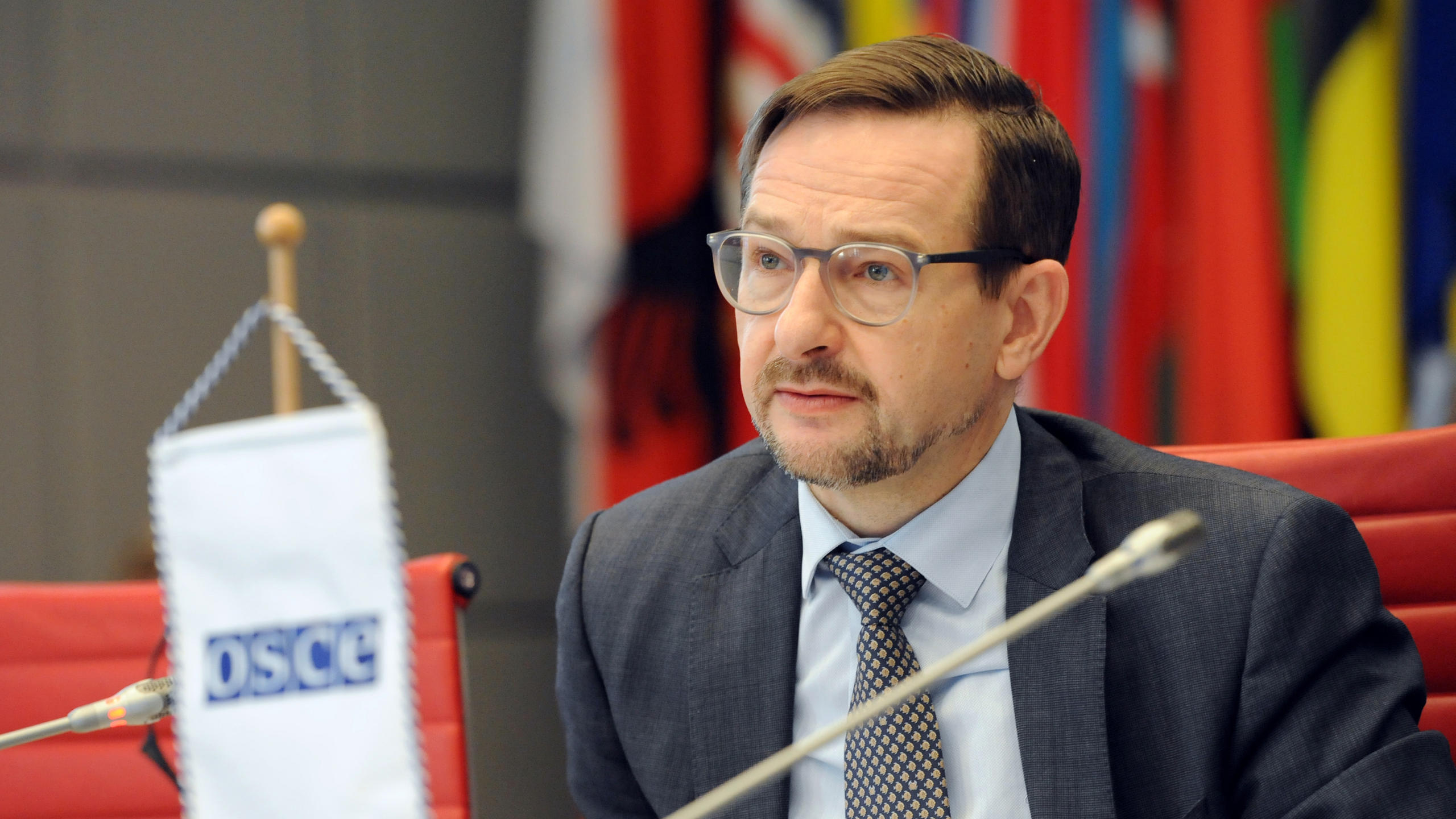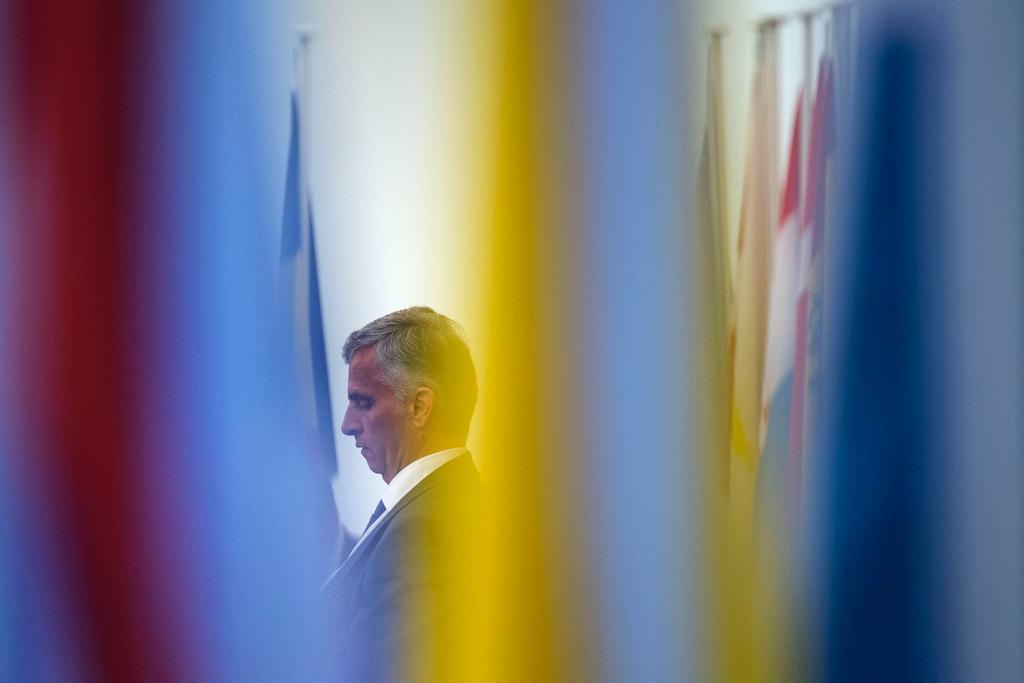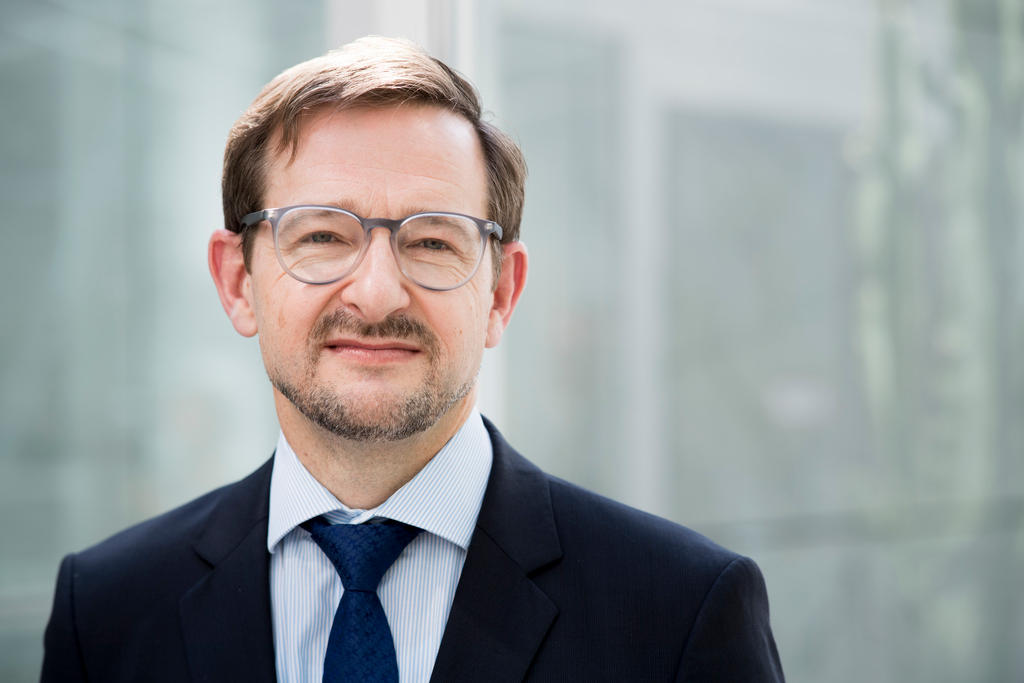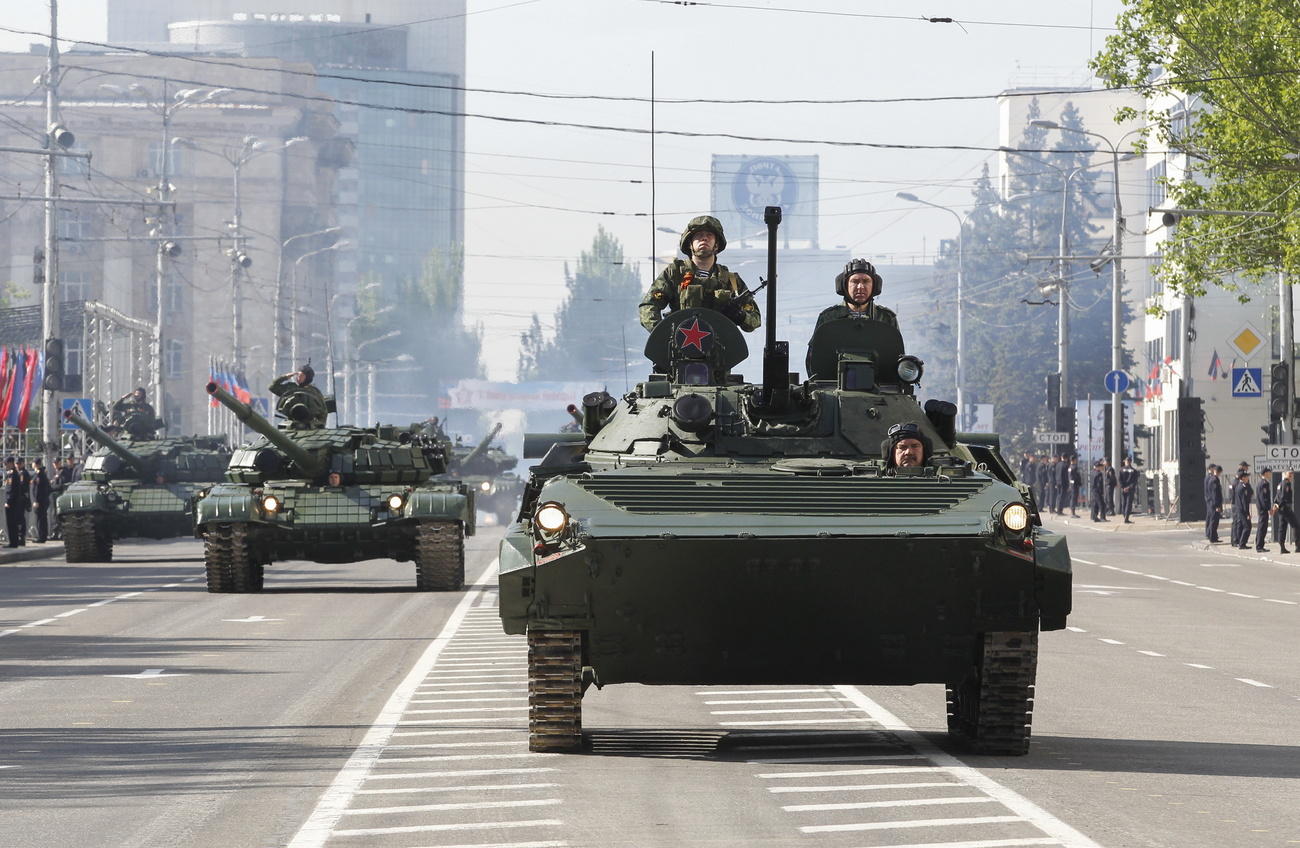Coffee with Europe’s peace manager

Thomas Greminger, the first Swiss Secretary General of the Organization for Security and Co-operation in Europe (OSCE), has a lot on his plate. Cooperation and dialogue have known better times. The unresolved Ukraine conflict is feeding a crisis of confidence between Russia and the U.S., the two key players in Euro-Atlantic security.
On a sunny morning, the Swiss capital Bern’s city centre reverberates with construction noise. Thomas Greminger has already jogged 40 minutes along the Aare river, answered his emails over breakfast in his hotel, and met the team responsible for cooperation with Eastern Europe at the Swiss Department for Development and Cooperation (SDC).
“We are active in the same regions; eastern Europe, central Asia and the western Balkans,” he tells swissinfo.ch in a café near parliament.
Greminger orders a Coke Zero. His working day is packed with appointments and he seldom goes out unless it’s for an official event. This high-flying Swiss diplomat is the Secretary General of the OSCE, headquartered in Vienna. The biggest regional security organisation in the world, it is primarily a platform for dialogue on security issues in the broadest sense. Given the current global situation it is a “unique forum,” Greminger says: Russia, the U.S. and the countries “from Vancouver to Vladivostok” sit down together once a week.
Team captain with political instincts
Engagement for peace, security, human rights and development are a recurring theme in Greminger’s career, which will soon span 30 years. A father of four, Greminger describes himself as an open and curious self-starter. As the most senior European guardian of freedom, he has to listen and show empathy towards others. Greminger doesn’t see himself as a mediator: “I don’t have the patience,” he says.
He sees himself as more of a manager “with a certain political sensibility.” Both are necessary to lead an international organisation like the OSCE, with about 4,000 employees. Greminger is not only responsible for securing the best possible conditions for the 16 OSCE field operations, for example, but must also ensure that the organisation has adequate financial resources.
The image of a football captain fits him and his role quite well, he says. “I am not the person who shoots the goals, but the one who pulls strings in the background and creates the conditions for others to shoot goals.” His easy, amiable manner suggests he doesn’t find it difficult to build good relationships with all the players – and with opponents, too.
Swiss passport “definitely not a disadvantage”
When he was named Secretary General by the 57 member states of the OSCE in July 2017, the organisation was in a delicate position. Quarrels between member states were the order of the day. The Ukraine conflict, which broke out in early 2014, had torn open the old rift between east and west and caused a deep crisis of confidence. A Secretary General from a country with either a NATO or pro-Russian agenda was unthinkable.
Greminger’s track record was one reason for his selection. As an ambassador, he had already led Switzerland’s representation at the OSCE and was known to have a good understanding of the organisation. Another reason was that Switzerland, which held the presidency of the OSCE in 2014, had been able to raise its profile during the Ukraine crisis. “This was my big trump card,” says Greminger, who led the Permanent Council of the OSCE at that time.
How important was his Swiss passport for that office? “Switzerland is not only viewed as neutral, but also as a competent conflict manager,” he says. It was certainly not a disadvantage to have a Swiss passport, he says.
Preventing escalation and recognising signals
The OSCE has also made a reputation as a good conflict manager, says Greminger, who is 58. “We are good at preventing conflicts from getting out of hand, at stopping local incidents from developing into widespread problems.” This was achieved, for example, in the Ukraine conflict, where the OSCE currently maintains its largest field operation.
Of course you could argue that isn’t enough. “I think that too,” says Greminger. But without the political will, the OSCE cannot achieve more. It has no means of enforcement. And it is also unable to offer incentives. “We can’t promise anyone admission to the EU.”
The OSCE tries to recognise positive signals by conflicting parties early on and interpret them correctly. As a second step, it tries to offer them face-saving steps forward. It is important to ensure all parties can go home with their heads high and present themselves as winners.
Ukraine conflict
Greminger speaks of a “light at the end of the tunnel” in the Ukraine conflict. At the moment, the signs are positive. Progress in implementing the Minsk agreement is conceivable and the bilateral relations between Kiev and Moscow could improve. Yes, he is somewhat more optimistic than in May, when Greminger described the situation in Ukraine as “totally blocked” in a presentation in Bern.
The Ukraine crisis is a “trust killer” for relations between East and West, he says. If there is no progress here, then everything else will remain very difficult. Greminger says that the states are primarily using the official dialogue forums of the OSCE to attack the other side, as though these were platforms for public diplomacy.
Avoiding the East-West prism
In areas where the international community can only make medium-term progress if it cooperates, Greminger wants to get to the point where the member states “here, at least, can set aside the East-West prism and take a step back in order to find solutions together.” Examples are in combating terrorism or cybercrime. “This offers a possibility to rebuild trust.”
Is he too optimistic? The OSCE secretary general says “the situation is very sobering at the moment and it’s a question of doing what is possible: preventing uncontrolled escalation.” So there is no direct threat of war in Europe? Greminger believes that no country really has an interest in letting things slide out of control.
What’s more, it is obvious that no country can solve the current challenges alone. Not even the U.S. or Russia. The instability of recent years is the best evidence that more co-operation is necessary, Greminger says.
Winding down with a book in bed
It is nearly noon and Thomas Greminger has to get going. He is off to Zurich airport and then to Vienna. Perhaps he will have time for his favourite kind of lunch break in the train. “If I don’t have a working lunch, then I like to eat a sandwich and read the newspaper,” he says.
The next day he faces his “serious life in Vienna,” as he puts it. On a normal working day, Greminger is home at 8 p.m. at the latest. “The biggest challenge for me is to relax and sleep well.” Before falling asleep, he reads a book for half an hour. He never turns off his mobile phone, but he doesn’t keep it in his bedroom. “The OSCE is a big apparatus,” he says. “The advantage of that is that the boss can sleep without the organisation going to sleep.”
The week after our meeting in Bern, Greminger will once again sleep in hotels and live out of a suitcase. This is what it means to be devoted to peace in Europe, which no one believed was endangered after the end of the Cold War — until 2014.
The Organisation for Security and Cooperation in Europe (OSCE) is the biggest regional security organisation in the world, with 57 member states in north America, Europe and Asia. As a forum for dialogue and a platform for campaigns, the goal of the OSCE is to promote democracy, human rights and the rule of law and to overcome differences between states and create trust through closer cooperation. Switzerland has been a member of the OSCE since its foundation in 1975. It held the organisation’s presidency in 2014 for the second time – the first was in 1996. All member states have equal rights and its decisions are reached in consensus. (Source: OSCE and the Swiss Federal Department of Foreign Affairs)
Translated from German by Catherine Hickley

In compliance with the JTI standards
More: SWI swissinfo.ch certified by the Journalism Trust Initiative




You can find an overview of ongoing debates with our journalists here. Please join us!
If you want to start a conversation about a topic raised in this article or want to report factual errors, email us at english@swissinfo.ch.